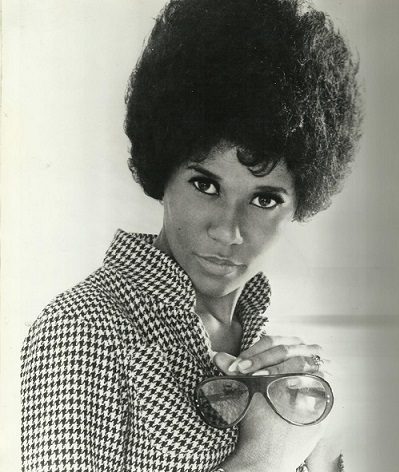Inexplicably overlooked despite her obvious talent, gospel-trained vocalist Sondra “Blinky” Williams recorded some very prominent songs, plus an additional pile of quality unreleased tracks for Motown, with none hitting the Top 100 charts (although her duet album with Edwin Starr did yield a chart single), causing fans of her work decades later to begin clamoring “Free Blinky from the vault!” on the internet.
FAST FACTS:
-
- Biggest Hit: “Oh How Happy” duet with Edwin Starr
- First Hit: “I Wouldn’t Change The Man He Is”
- Biggest Album: Just We Two (with Edwin Starr)
- Career Highlight: With Motown, recording “T’aint Nobody’s Business If I Do” for the film Lady Sings The Blues; also singing the female lead on the theme song for the hit TV series Good Times.
Born Sondra Williams in 1944 in Oakland, California, she moves to Southern California early in life. Her father Austin F. Williams is a preacher in Stockton when she begins performing at age 6. She is leading choirs by age 9. Her childhood nickname “Blink-Blink” is derived from her habit of frequently blinking her eyes. Later, in high school, this morphs into “Blinky.”
In 1959, at 14, she is a founding member of an amazingly stellar group of young gospel artists, The Cogics (named for The Church Of God In Christ). They include a young Andrae’ Crouch and his twin sister Sandra Crouch, Edna Wright (sister of Darlene Love and later lead singer of Honey Cone) and three other future Motowners, Gloria Jones, Frankie Kahrl (who would record as Frankie Karl and, on Gordy in the late ‘70s, as Frankie Kah’rl) and organist Billy Preston. The Cogics record one LP, It’s A Blessing, in 1964 on the Vee-Jay subsidiary Exodus Records.
Singles from the It’s A Blessing LP are released on Simpson Records (owned by “Bishop” Richard Simpson and distributed by Vee-Jay) in ’64. Credited to “The Cogic’s,” both sides of “It’s A Blessing/Since I Found Him,” are written by Andrae’ Crouch. Williams sings lead on “It’s A Blessing,” showcasing her already mature powerful, earthy voice, a voice that she would later describe as “raspy.”
A second single on Simpson from the LP, also with both sides written by Andrae’ Crouch, is credited to “The Cogic Singers: Teen Age Gospel Wonders Of California” and additionally lists the featured soloists on the label; on “It Will Never Lose Its Power,” Gloria Jones is credited as lead vocalist while on “I Don’t Need Nobody Else,” Sondra Williams gets lead credit.
Still professionally known as Sondra Williams, she releases her first solo single on Vee-Jay Records in 1964, “He’s Got The Whole World In His Hands/Heartache.”
In 1967, Atlantic Records releases her solo debut LP, Hark The Voice, on which she’s billed as Sondra Williams (Miss Heartaches). Produced by Simpson, the tracks include a mix of traditional material, six Andrae’ Crouch compositions and the Billie Holiday song, “God Bless The Child.” Two singles are released from the LP, “He’s Got The Whole World In His Hands/Hark, The Voice” and “God Bless The Child/Heartaches.”
Changing over to secular music, she catches the attention of the Temptations Paul Williams and Eddie Kendricks while performing at the Los Angeles celebrity disco hangout Maverick’s Flat. They introduce her to their manager, Motown exec Shelly Berger, and she signs with the label.
Motown bills her as “Blinky” and she begins touring regularly as an opening act for the Temptations, an arrangement that would last two years. Producer Hal Davis cuts a few tracks with her and she moves to Detroit, where Motown then assign Ashford and Simpson to produce her. They cut about a half dozen tracks together.
For her first Motown single, Ashford and Simpson take a dynamic, blues-tinged composition originally intended for Valerie, “I Wouldn’t Change The Man He Is,” and give it to Blinky. “We needed a song that would stretch her vocal chords because we knew she had a lot of depth to her,” Nick Ashford would later say. “She’s always gonna dig deep, you know?” Released on Motown in November 1968, this brilliant single gets a fair amount of radio airplay but unjustly never cracks the Top 100, peaking at 128 on the Pop chart.
Motown revives The Motortown Revue for an eight-day run at Detroit’s Fox Theater during the Christmas/New Year holiday season and along with the Temptations, Gladys Knight & the Pips and Stevie Wonder, Blinky is among the artists who perform, helping to promote her first Motown single. Wilson Lindsay of The Detroit Free Press calls her “a very pretty girl from Los Angeles (who) has everything going for her that stars are made of. She sings very well and she communicates.”
The buzz surrounding Blinky at Motown causes Quality Control head Billie Jean Brown to conceive pairing her for duets with Edwin Starr, fresh off his first big smash “25 Miles.” She enlists Frank Wilson to co-produce and, along with other Motown producers, they record record enough tracks in Spring 1969 for and album.
Prior to the LP’s appearance, Motown releases “Oh How Happy/Ooo Baby, Baby” as a Blinky & Edwin Starr single on Gordy in July. The A-side, which covers the big 1966 hit Starr wrote for the blue-eyed soul group Shades Of Blue, reaches Number 92 on the Pop charts. Black radio deejays later flip the record and the B-side gets some airplay but does not chart.
Motown releases a live LP from the December Motortown Revue shows in mid-1969 and Blinky is featured on two songs, Otis Redding’s “I Can’t Turn You Loose” and “I Wouldn’t Change The Man He Is.”
The Blinky & Edwin Starr album Just We Two on Gordy is released in October ‘69. No further singles are issued from it.
During 1969, Blinky meets Sammy Davis Jr. in a Los Angeles recording facility when audio from her session accidentally gets channeled into his headphones in an adjacent studio. He soon asks her to tour with him as his opening act, she accepts and he becomes a prime influence on her career. He begins mentoring her, acting as co-manager with Shelly Berger and they perform together for a number of years. She appears with Davis at top clubs and theaters nationwide, on an episode of the nationally syndicated Mike Douglas TV variety program and will be part of his troupe in 1972 that visits Vietnam on a USO tour to perform for military personnel.
Motown goes back to Blinky’s 1968 work with Ashford and Simpson for her next solo single, set for a 1970 release. But the scheduled street date, likely in July, of “How You Gonna Keep It (After You Get It)” is cancelled.
In 1971, Motown releases a compilation LP Rock Gospel and, among other acts like the Supremes, Marvin Gaye and Gladys Knight & the Pips who contribute tracks, a new Blinky version of “God Bless The Child” (which she had previously recorded for Hark The Voice) is included on the album.
Blinky continues to record numerous solo tracks for Motown and albums are envisioned – by some estimates, three of them — but never released. No further singles are released either until 1972 when a slow but raucous shuffle-blues version of “Money (That’s What I Want)” comes out on the MoWest label in June 1972. Produced by Gil Askey, who also helmed the equally strong B-side, a gorgeous bluesy update of the Jerry Butler and The Impressions classic “For Your Precious Love,” the single unjustly never made the charts.
In June ’72, Blinky rejoins Andrae’ Crouch singing background alongside Crouch’s sister Sandra for his performance at the five-day evangelistic conference and concerts in Dallas, Explo ’72, considered the biggest evangelistic event of the decade, having a major impact in the development of the Christian music industry.
As part of Motown’s momentous venture into filmmaking on the Billie Holiday biopic Lady Sings The Blues starring Diana Ross, Blinky records the early blues standard, perhaps best known as a hit for Bessie Smith, “T’aint Nobody’s Bizness If I Do.” Produced by Askey, it is heard at various key points throughout the film when Ross’s character plays the Bessie Smith recording of her favorite song. While Blinky’s voice is part of the movie, she does not appear herself, although her recording of “Bizness” has immediate impact for the film’s audience. It becomes the only non-Ross female vocal included on the soundtrack’s double album, albeit only a shortened version. However, Motown does release Blinky’s full recording of “T’aint Nobody’s Bizness If I Do” as a single in 1973 and it gets good radio airplay, although it does not chart.
Working with writer/producer Clay McMurray, Blinky records her final Motown single, the 1973 release “Get The Tangle Out Of Your Lifeline.” The label on this slow, soft track notes that it is from Blinky’s forthcoming album Softly. That LP does not get released.
Along with Oma Drake and Marti McCall, Blinky sings background on three tracks of John Lee Hooker’s 1973 ABC LP Born In Mississippi, Raised Up In Tennessee.
When the Norman Lear-created TV program Good Times premieres in Feb. 1974, its theme song features Blinky and Jim Gilstrap (Stevie Wonder’s former backing vocalist who sang the opening lines of “You Are The Sunshine Of My Life”), along with a gospel choir. The popular weekly sitcom, about a poor working-class African-American family living in a Chicago housing project and contending with real-world problems, would run until 1979.
With much recorded but little released, Blinky leaves Motown in ’74, at the urging of Quincy Jones, for whom Blinky is now opening shows. She signs with Reprise Records, founded and still partly owned by Frank Sinatra, where Sammy Davis recorded during the ‘60s, and where former Motown exec Mickey Stevenson composes and produces her lone Reprise release. That single, “Walk With Me Jesus”/”When Love Calls Your Name,” is credited to Blinky Williams. It does not chart.
Over the next decade, Blinky gets involved in the choir robe business and begins transitioning away from a full-time show business career.
In 1984, old friends Gloria Jones, Billy Preston, and Frankie Kahrl (now calling himself Frankie K. Springs) gather with Blinky for a gospel reunion LP The Cogic’s on the Nashboro label.
Blinky is among the former Motown artists who record for Ian Levine’s Motorcity Records in the late 1980s and early 1990s. A 12-inch single “Good For Nothing” scheduled for a 1992 release is shelved due to the label’s financial difficulties, but an uptempo version of “I Wouldn’t Change The Man He Is” will be issued on multiple compilations of Levine tracks. “Lifesaver” is another Blinky track for Levine that gets released on an anthology.
Asked by music historian Bill Dahl for his 2001 book Motown: The Golden Years why her career at Motown never blossomed, Blinky replies, “Your guess is as good as mine. Just as I was getting hot, Diana was leaving the Supremes, David Ruffin had left the Tempts, there were a lot of breakups, Gladys needed a hit, Diana needed a hit. I sorta got tossed to the side.”
Slowly, some of Blinky’s unreleased Motown recordings begin to emerge. In 2004, her funky Al Cleveland-produced version of the Marvelettes’ “The Hunter Gets Captured By The Game,” recorded in January 1969, is released on the Universal Music UK compilation CD Motown Sings Motown Treasures.
On the 2005 Universal Music UK CD completion A Cellarful of Motown Vol. 2, Blinky’s rendition of Fontella Bass’s “Rescue Me” sees daylight. Raynard Minor co-composed and co-produced the original 1965 hit when he and Bass worked for Chess Records. When Minor joined Motown, he selected Blinky to re-cut it in 1969.
Blinky’s brilliance shows up twice on the 2007 Universal Music UK compilation CD A Cellarful Of Motown Vol. 3. First is the mysteriously neglected leftover track of her 1969 Edwin Starr duet sessions, “Never Give You Up,” written and produced by Richard Morris. On the second, her energetic cover of Marvin Gaye’s “Can I Get A Witness,” Blinky cuts to the bone to find the song’s twin roots in gospel and funk.
On Halloween Night 2009, Blinky (as Sondra Williams) and Sharon Jones provided backing vocals for the rock group Phish, who put on a musical “costume” by performing the entire Rolling Stones album Exile On Main Street album at Festival 8 in Indio, California.
The 2010 CD Universal Music UK compilation A Cellarful of Motown Vol. 4 includes Blinky singing “It’s Gonna Be Always,” recorded in the Spring of 1969.
Reel Music announces in 2010 it will release a 2-CD set of Blinky’s Motown recordings the following year, but that set never emerges when the label ceases operation. Over the next few years, Motown fans to commence an informal “Free Blinky” campaign on social media.
In 2018, Universal Music Group releases seven previously unreleased Blinky tracks recorded in 1968 to digital platforms on the two volumes of Motown Unreleased 1968.
Finally, in 2019 (?) Reel Gone Music picks up the torch where Reel Music stumbled and releases a 2-CD set of Blinky’s Motown recordings.





